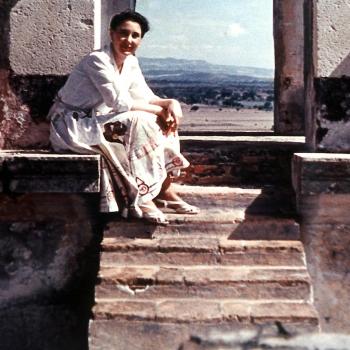Today, for the first time in three months, I paid a visit to Our Lord in the Blessed Sacrament. I have been longing for this moment since March, when every church and chapel in England shut its doors. The time of separation from the Eucharist has been an intense trial.
Don’t get me wrong; these months have also been immensely fruitful. As soon as I began to accept that I could no longer pray my Holy Hour before a tabernacle, and that I could no longer receive His physical presence, I was able to embrace the unique way in which the Lord was inviting me into relationship with Himself. My prayer became more hidden, more solitary, more silent (Matthew 6:6). I learned to rely on the graces of my Baptism, to recall more faithfully His constant spiritual presence within my heart.
As Etty Hillesum writes, “There is a really deep well inside me. And in it dwells God. Sometimes I am there, too. But more often stones and grit block the well, and God is buried beneath. Then He must be dug out again.” And as a result of this ‘digging,’ the Lord has broken down barriers I had inadvertently built between work and worship, home and chapel, my own thoughts and dialogue with Him. So I am full of gratitude for my time under lockdown.
But it was a tremendous challenge. Day after day, I burned with the question, “How long, Lord? How long must I carry sorrow in my soul, grief in my heart?” (Ps 13). I desired to run to him with everything — my infidelities, my insights, my desires, my joys — to lay it down before the tabernacle at His feet. Instead, I was faced with my ordinary bedroom and His apparent absence. In times of darkness and desolation, or when I neglected prayer, His silence was torturous. In a time of tremendous global suffering, through pandemic and loneliness and racial injustice, the world seemed to cry out: “My tears have been my bread day and night… Where is your God?” (Ps 42).
One fact sustained me: the only reason I feel His absence is because I have encountered His presence. The only reason I long for Him is because His love has struck and radically changed me. And even though I am weak and blind, I continue to find fulfilment in my work, joy in my friendships, and meaning in suffering because of His fidelity. So the feeling of His absence need not frighten me. Rather, it should lead me to beg, on behalf of my own heart and the whole world, for Him to come once more. As Marilynne Robinson wrote in Housekeeping:
For when does a berry break upon the tongue as sweetly as when one longs to taste it…and when do our senses know anything so utterly as when we lack it? For to wish for a hand on one’s hair is all but to feel it. So whatever we may lose, very craving gives it back to us again. And here again is a foreshadowing—the world will be made whole.
The world will be made whole, indeed.
Reunion, today, was sublime. If my neuroimaging analysis had not recalled me to work, I could have stayed there for the rest of the day. In gazing upon the tabernacle, all things fell into their place. I knew, with certainty, that He was never absent. And yet, even as I prayed before Him, I felt the same unanswered desire for Him. My heart remained restless. Just as His absence had made me yearn for Him, so, too, did His presence generate a deep longing.

This is the truth I wish to share with you today. Longing for the infinite is constitutive of our life on Earth. Yearning for the love of God is constitutive of our relationship with Him.
A recent neuroscience study provides a beautiful analogy for this fundamental truth of our spiritual life. The team examined the neural networks of prairie voles — one of a tiny number of species that mate for life, like humans. Specifically, the researchers compared brain activity from three time points: when prairie voles first met their partners, a few days after mating, and a few weeks after they had begun to cohabitate. Surprisingly, brain activity wasn’t all that different when prairie voles were huddling with strangers rather than their partner. However, a unique cluster of cells in a region called the nucleus accumbens, which mediates reward and motivation, consistently lit up when the prairie voles ran to meet their partner after a period of separation. The longer the relationship, the larger this cluster of cells grew. In other words, longing is a constitutive part of the biological relationship between loved ones. The stronger the love, and the longer the shared history, the greater the longing.
So, too, in our spiritual life. We traverse many circumstances and events in any given day. Through it all, our awareness of the Lord may fluctuate, but our longing for the Mystery remains. It runs deeper than our affective experiences, deeper than our cognitive convictions. We may strive to suffocate it, or fill it with something other than God, but the longing remains.
And the miracle is this: our longing has an answer. The Mystery dwells among us and desires to lead us to eternal life with Him. Our task is to allow Him, through our longing, to transfigure our lives and bring about His kingdom. In the words of Sr. Paula Jean Miller, “the human being is person in the measure that she lives toward the Transcendence that descends to meet her.”
In this time of separation — from the Eucharist and from our loved ones — let us not be afraid of our longing, for therein lies our true self; therein lies our love.
If you enjoy the blog, click here to join my mailing list.












